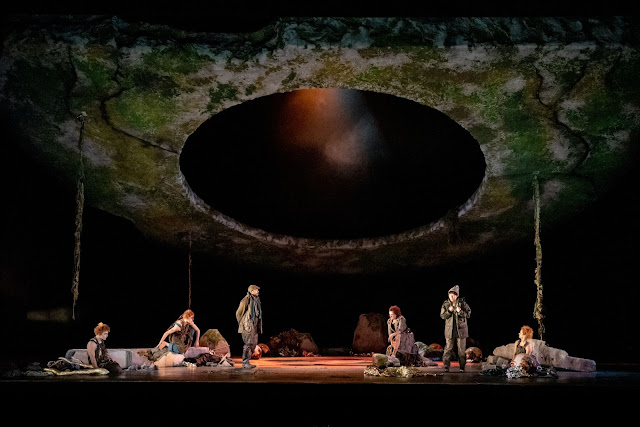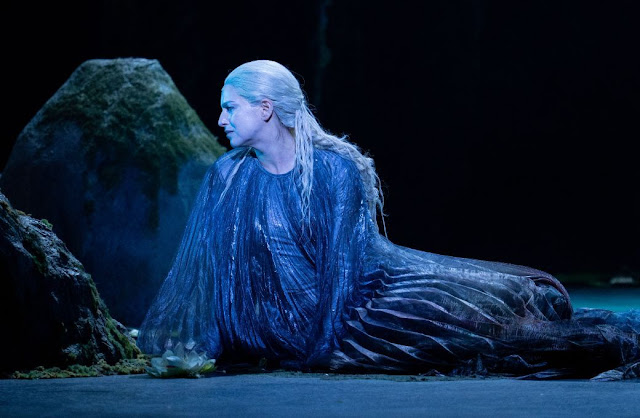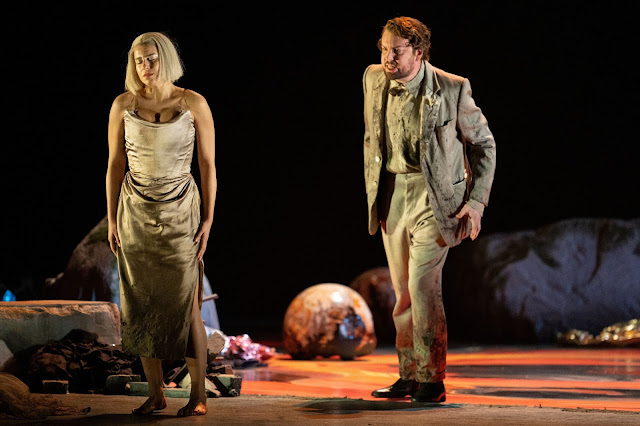 |
| Dvorak: Rusalka - Ross Ramgobin, Sarah Connolly, Hongi Wu - Royal Opera House (Photo Camilla Greenwall) |
In Europe, directors have sometimes taken a rather harder-edged view, with Christoph Loy's 2020 staging in Madrid exploring ideas of fractured family relationships, with Rusalka as a crippled dancer in a theatre [see my review]. An earlier Salzburg production set the work in a brothel, but when this production came to Covent Garden in 2012 it failed to convince [see my review].
Covent Garden has now had another go, creating its own production, directed by Ann Yee and Natalie Abrahami, with sets by Chloe Lamford, costumes by Annemarie Woods, lighting by Paule Constable and choreography by Ann Yee. Asmik Grigorian was Rusalka with David Butt Philip as the Prince, Sarah Connolly as Jezibaba, Emma Bell as the Foreign Princess and Rafal Siwek as Vodnik. Semyon Bychkov conducted the orchestra of the Royal Opera House.
 |
| Dvorak: Rusalka - Asmik Grigorian - Royal Opera House (Photo Camilla Greenwall) |
The production is proudly sustainable, recycling older materials, and in parallel with this, the trajectory of the plot was taken as a metaphor for man's relationship with the natural world. At least, that was what I read in the press beforehand. But watching the piece, we received a different impression. Now, I will admit that we did not buy a programme, so did not read whatever the production's creators had to say in advance, but then I am a great believer in stage productions standing up for themselves and not needing explanations.
Act One featured a striking evocation of the forest and the pool, the atmosphere dark and mossy but very theatrical. This looked like a stage set, the stylised perfection of the pool and the rocks. The three wood sprites were clearly intended to be at one with the forest, but frankly, I found their costumes fussy and overdone. Rusalka and her father were evocatively clad in a style which evoked classic images of Tolkien's Elves, perhaps.
In Act Two, a stylish modernist rectilinear pavilion had been placed downstage across the front of the lake, which had been gardened with extra lighting. The style here was rather Japanese, something emphasised by the two sculpture installations in the pavilion. Costumes were similarly stylish and stylised, and whilst some chorus members seemed to have oil smeared on them, it seemed simply another extreme decorative effect that went with the characters striking outlandish attitudes. During the scene between Rusalka and her father, with the two of them downstage in the pavilion, the Prince and his guests retreated to the far side of the lake, dimly lit and creating rather lovely stage images. But then, at the end of the act, the party guests brought giant gilded inflatables out onto the lake! Act Three, returned to the lake, but here everything was stripped back and bare. I think it was meant to be despoiled, but it looked striking, poetic and highly abstract and the design could just as easily have reflected the emotional disturbance of the characters. The result was that the staging did not read quite as easily as its creators might have wished, yet provided some wonderfully poetic images.
 |
| Dvorak: Rusalka - Aleksei Isaev, Vuvu Mpofu, Gabriele Kupšyte, Anne Marie Stanley - Royal Opera House (Photo Bill Knight) |
I have to admit that I was not taken with Ann Yee's choreography. In Act One, the woodland sprites danced in a way which made you think of 100s of different traditional Victorian stagings, reflecting the self-conscious theatricality of the setting. But more importantly, Yee did not seem to be responding to the Czech rhythms and styles in the music, this was all the more frustrating having Semyon Bychkov in the pit drawing wonderful things from the orchestra. In Act Two, there was no dancing. Gone was any idea of having the dance as a weapon, as in Jack Furness' production at Garsington last year. Here, we simply had extreme posturing in stylised, outlandish poses, trying to show us the unnatural nature of the party guests.
Thankfully, the musical values were supremely high and this made for a highly satisfying evening. Whilst all the roles were superbly sung, the music palm went to Semyon Bychkov and the orchestra. Bychkov is music director of the Czech Philharmonic Orchestra, and he seems to have managed to bring a little bit of the Czech Republic to the Covent Garden pit. Dvorak's score is wonderfully rich, like many of his late orchestral scores (from Symphony No. 8 onwards), the writing often has a complex, multi-layered texture to it and Bychkov managed to encourage the orchestra to really bring out the rhythms creating vivid orchestral textures and always imbued with a sense of dance. Rusalka has a lot of instrumental moments, and in Bychkov and the orchestra's hands, these really danced. It was a vivid and richly characterful evening.
As Rusalka, Asmik Grigorian looked and felt otherworldly, we always felt that she was never quite of the human world. She has a silvery voice but one with a bit of steel in it too, so that she was able to sing with a lovely sense of line yet she has the heft to make the line count - the first Rusalka, Růžena Maturová, was rather more than a lyric soprano, though she sang Marenka in The Bartered Bride her roles also included Amelia in Un ballo in Maschera, Donna Anna in Don Giovanni and Eva in Die Meistersinger as well as creating Dvorak's Armida.
Throughout Act One, there was a real sense of longing in Grigorian's performance with a poignant but never over-romanticised Song to the Moon. In Act Two, she managed the trick of being expressive physically, whilst her long scene with her father, the Vodnik (Rafal Siwek) was one of the highlights of the evening. Throughout this act, Grigorian gave the sense that Rusalka was never quite physically present in the human world. And in the bleak, yet stylish Act Three, she loomed melancholy and infinitely touching. This was a richly detailed performance, and definitely one for the ages.
David Butt Philip was everything the Prince should be, and Butt Philip managed the trick of making this rather shitty person sympathetic. He made the high-lying parts of the line seem intense, pushing the Prince's emotions to the fore. He was definitely not emotionally intelligent, and the opera is as much about his growing up as Rusalka. And in Act Three, when clarity comes and he understands, Butt Philip was simply glorious. Young, anxious and struggling with all these turbulent emotions, his solo and scene with Grigorian really crowned the performance, a thrilling and moving account.
 |
| Dvorak: Rusalka - Asmik Grigorian, David Butt Philip - Royal Opera House (Photo Camilla Greenwall) |
Sarah Connolly's Jezibaba was definitely not the caricature witch, and one reviewer commented that the looked like an eco-warrior. Despite her rags, she looked stylish and throughout regarded the behaviour of the others, the humans and the sprites, with wry amusement. Her incantation scene in Act One was delightfully eerie, and she made an appearance at the Act Two party which was a bit blink and you'll miss it, which was a shame. Her detached, amused attitude came to the fore in Act Three, and throughout Connolly sang the music with fine style, no gurgling and mugging here. She made me wonder whether it would be possible, with the right singer, to double cast it so that the Foreign Princess was sung by the same singer, as an incarnation of Jezibaba.
Emma Bell's Foreign Princess was stylish, over-the-top and passionate. Her opening moment was full of passionate fury, and throughout there was a detached sense of style. She was nicely manipulative, but throughout it was Bell's detachment and passion that crowned the performance.
Vodnik was Rafal Siwek (replacing Matthew Rose), he looked and sounded very stylish. There was nothing grotesque about this Vodnik. He was never very threatening, but his care and concern for his daughter were finely done. Siwek sang with great style and poise, and as I have said his scene in Act Two with Grigorian was one of the evening's highlights.
The smaller roles were all well taken. Ross Ramgobin and Hongni Wu made a wonderful double act as the game-keeper and kitchen boy (here a servant), sounding vocally at ease and managing the right balance of drama, poetry and comedy. Vuvu Mpofu, Gabrielė Kupšytė and Anne Marie Stanley were the wood sprites, rising over unflattering costumes and insipid choreography to give finely engaging performances. Josef Jeongmeen Ahn was the fine-voiced hunter.
 |
| Dvorak: Rusalka - dancers in Act Two - Royal Opera House (Photo Camilla Greenwall) |
There were dancers present throughout, as wood sprites, Jezibab's followers and partygoers, working hard indeed. This meant that we never saw Rusalka's sisters, they remained off-stage. The off-stage contributions, including from Siwek's Vodnik were amplified rather horribly.
This was a staging that never quite read as its creators intended, and you feel that some revisiting might be a benefit (it was their main stage debut at Covent Garden). Yet, you cannot dismiss a production when the directors get such fine performances from the cast. Certainly, this was wonderfully musically satisfying, as fine a performance as you could wish for and ultimately rather moving. The abstract nature of the designs for Act Three worked well, throwing a spotlight on the performances, so supported by Bychkov and the orchestra, Grigorian and Butt Philip gave us some real magic.
Never miss out on future posts by following us
The blog is free, but I'd be delighted if you were to show your appreciation by buying me a coffee.
Elsewhere on this blog
- A bit of a whirlwind: counter-tenor Francis Gush discusses his forthcoming debut in the title role of Handel's Giulio Cesare with English Touring Opera - interview
- A voyage round Pauline Viardot: Anna Bonitatibus & Angela Hewitt in Berlioz, Liszt, rare late Rossini and something by the Viardot herself - concert review
- On Dead Man Walking: baritone Michael Lafferty on learning the role of Joseph de Rocher in Jake Heggie's opera for its Guildhall School performances next week - feature
- Bach: Barnaby Smith, artistic director of VOCES8, & the Illyria Consort in a disc of alto arias - record review
- Listening with different ears: Francesco Cordi directs Bach concertos and Brandenburg Concertos at Wigmore Hall - concert review
- A Byzantine Emperor at King Henry's Court: Christmas 1400, London: Cappella Romana explore music from the Byzantine & Sarum Rites - record review
- Imaginative & very human: Rodula Gaitanou's new production of Strauss' Ariadne auf Naxos at Opera North - opera review
- A huge amount to admire: Richard Jones' production of Wagner's The Rhinegold debuts at ENO - opera review
- Music from the African Continent & Diaspora: I chat to Samantha Ege about her latest disc, Homage - interview
- NYCGB Young Composers 4: NMC's annual collaborations with NYCGB results in an anthology disc of eight striking and challenging new works in superb performances by the young singers - record review
- Seductive and magical moments: Sam Cave's exploration of music for the contemporary guitar enchants and intrigues - concert review
- Home











No comments:
Post a Comment